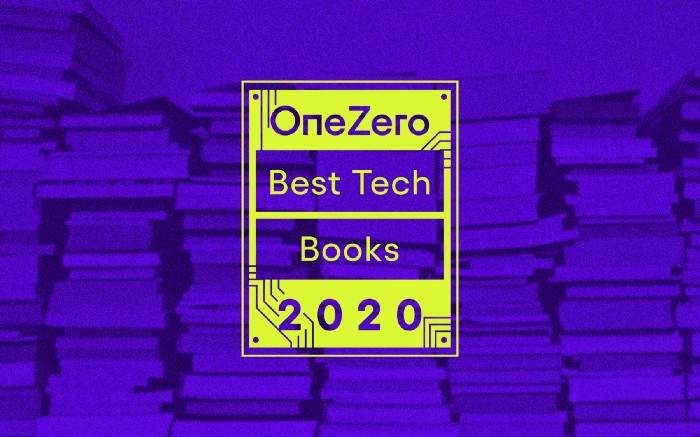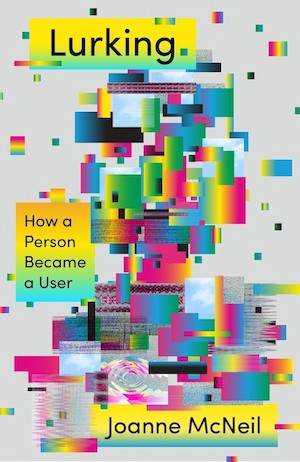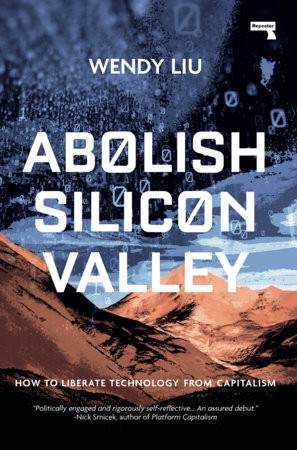These 21 best science and technology readers (all about empowering users) are of great significance to our understanding of the turbulent future world.
The Translation Bureau is a subordinate translation team, focusing on science and technology, business, workplace, life and other fields, focusing on introducing new foreign technologies, new ideas, and new trends.
Editor’s note: This year, the industry’s mainstream view of the technology industry has quietly and seriously changed. Professionals and observers have observed and analyzed the development of technology more deeply, objectively and comprehensively. They want to know more about what the technology industry is doing. For more in-depth frontier analysis of changes, problems, and trends that will enhance your understanding of the future world, please read this summary book review by Brian Merchant. For the original text, please refer to The Best Tech Books of 2020 Are All About Giving Power to the User.
Key points: The technology industry under the influence of the epidemic is also undergoing major changes, that is, it is beginning to focus on empowering users. It is time to critically understand a series of changes and trends from a development perspective, and improve the ability to predict the future technological world.
OneZero Best Technology Book of 2020
This year, the industry’s mainstream view of technology has quietly and seriously changed, and this change has occurred even before the epidemic. Most of the time, the release schedule of science and technology books is filled with biographies of startups, founder profiles, memoirs of technical masters, business and management books, along with some “critical” titles-“Your Disclosure And debates”, “Children are using mobile phones excessively” and other similar long articles of criticism.
However, as an editor of OneZero’s book department, I have observed that this year this ratio seems to have been strongly reversed-extremely detailed books or articles documenting events in the technology world, such as Steven Levy (Steven Levy) )’S “Facebook: Inside Story”, the number of works expressing criticism, opposition and non-narrative greatly exceeded.
In other words, the authors have completely digested this technological trend. In the past five years, the excessive publicity of the social influence of Silicon Valley giants and their products has left current affairs commentatorsCan do something, and under the catalysis of the bad 2016 election, industries that have maintained a strong momentum and aura for most of this century have begun to enter an era of criticism. Obviously, this is not the first year that a large number of critical science and technology books have been published, but for the first time, the authors have either unanimously and thoroughly absorbed criticism or experienced the process of inspiring criticism. No matter what, they are all in a dominant mode. occur. (It’s worth noting that, considering that in the past, it is well known that the scientific and technological circles are mainly masculine images, and there are many female authors in these works.)
2020 marks a turning point, the beginning of the battle for platform users, not owners.
Take this year’s undisputed hot technology book, this book is neither a blunt founder biography nor a behind-the-scenes story of startup X, but a memoir of various surreal phenomena and wrongdoings in the technology industry. , Its perspective is unique and clear, and it does not present these bad phenomena or behaviors in a fanciful manner. It is precisely because of Anna Wiener’s “Uncanny Valley” that makes the “New York Times” enter the top ten of the annual book and newspaper subscription list and appear on countless other book and newspaper carriers. It is subversive and very nuanced, and has certain considerations; it fully considers the dimensions of technology companies’ products and social forces.
This year’s best technology-related books often contain this critical spirit, which comes from those who feel the most profoundly destroyed by technology. 2020 marks a turning point, starting to fight for platform users, not owners. From the humble opinion of a writer and book editor, I would like to introduce the following best technology books of the year.
“Uncanny Valley” (Uncanny Valley), by Anna Wiener (Anna Wiener)
“Mysterious Silicon Valley”
Wiener’s memoir about being lured into the technology industry is considered to be the most authentic portrayal of the life of ordinary white-collar workers in Silicon Valley. These ordinary white-collar workers are subject to the founder Don Quixote’s whims and demand for profit. Had to interrupt this kind of business, or be like a woman suffering from endless poison, helpless to everything. This memoir was a great success as a literature, because Wiener willPositioned as the agent of the readers, these readers once had hope for this promising industry and felt that everything was new and exciting, but now they are exposed to the cruel reality-always ugly to the same power To reiterate, over-proclaiming the existing things, so the fantasies of these readers are disillusioned. (The most subtle thing is that Wiener writes in an unusual way of expression that is both ridiculous and poetic. At the same time, she is still one of us, deteriorating and disappointing through accumulation Headlines, stupid mistakes, blogs, etc. to filter writing topics.)
Because it does not contain proper nouns, it does not contain any business names–this choice not only proves to be effective in style, but also promotes free promotion by inspiring readers to list a large list of possible objects and related guesses- -This effect reflects that our memories of these short-lived products, companies and celebrities are very vague. The whole process is like this: startups first shine and then languish, platforms start to attract complaints, and founders may be forgotten by people , But at the same time it flows into the long history of holistic digitalization and decadence.
This is an epic, melancholic book that tells the relationship between capital and power in this magnificent, slightly tragic era.
Lurking, by Joanne McNeil (Joanne McNeil)
“Latent”
My friend Claire Evans marveled at McNeill’s superb and outstanding digital life memoirs/history, describing it as “the history of the human internet that should have appeared long ago but has come late.” (Written by Evans A very good book, dedicated to women who build Internet technology, so she is fully qualified to make the above comments.) Although I might adjust it to “the first personal Internet history”, this is mainly It is a conclusion drawn from the perspective of a user who has penetrated into the online world-as far as we know, this is usually a lonely and ego person. “Latent” not only contains rich and profound information, but also has beautiful brushstrokes. It is not about the great achievements and heroic actions of the people who built the modern world system, but focusing on the people at the other end and telling the history that they left to move forward. .
Like “Mysterious Silicon Valley”, the amazing thing about “Latent” is that it can take advantage of the author’s specific”From the Voice of Silicon Valley” conducted a series of enlightening interviews with technology workers at all levels, from restaurant employees to company founders; “Secondary Attention Crisis” strongly proved that the Internet advertising bubble is about to burst. Tim Huang examines and analyzes the architecture and abnormal motivations that lead us to danger, and proposes one or two new directions.
“Abolish Silicon Valley” (Abolish Silicon Valley), by Wendi Liu
“Abolition of Silicon Valley”
Liu Wendy used to be an intern at Google and later founded her own technology startup. Now she wants to flatten Silicon Valley (of course this is just a metaphor). Her goal is to replace it with a fair and democratic, development and deployment technology-related model, not through profiteering and the use of oligarchy-this seems reasonable to me! Wendi Liu’s book is partly a memoir and partly a manifesto. Although the title of the book is merciless, this book is approachable and even reads with a relaxed and pleasant feeling. If the new crown pneumonia epidemic does not make a comeback, the book “Abolishing Silicon Valley” will cause a lot of discussion – and will make the elites in the technology field feel helpless. I strongly suggest that this book will be a hot topic again in 2021.
“Glitch Feminism: A Manifesto” (Glitch Feminism: A Manifesto) by Legacy Russell
Russell’s e-net feminist manifesto believes that failures in a particular system provide us with an opportunity to evaluate the entire system–we can take advantage of this unique opportunity to repair them. Various faults or malpractices quickly appear in our corrupt system one after another, prompting the emergence of the overwhelming concept in 2020: the life of black people is also life. In the face of huge injustice, the rise of opposition to funding the police movement has opened up some space for real reforms and created more possibilities.
Automation and the Future of Work, by Aaron Benanav
In short,This is the best book on automation published in 2020-it can also be regarded as the best book of the past few years. Benanaf is a sociologist, and his research is convincing. Its research shows that although futurists claim that “robots will take our jobs”, the accelerated development of automation is not the root cause of our labor dilemma. On the contrary, the culprit is the chronic shortage of good jobs. The problem is not how much human labor is replaced by robots, but that the growth rate of advanced economies is not fast enough to provide good job opportunities for all people who need to work in a capitalist society. The productivity of workers is higher than ever, but in most developed countries, output has not risen, but is falling.
This call is bold, but vital, and has received widespread support. It calls for rethinking the automation theory that has been considered the gospel by most people in the technology circle.
How to Destroy Surveillance Capitalism, by Cory Doctorow
Well, we are a bit selfish here. This is the first book published by OneZero this year. In this book, Doctoro made a short but crucial argument (to reiterate, this evaluation is just the words of our family), that is, in order to truly respond in a meaningful way To monitor capitalism, you must first deal with the issue of technological monopoly. This is a powerful argument, sometimes sharp, sometimes witty, and very readable.
Science and technology story with big budget narrative style:
“No Filter: The Inside Story of Instagram” (No Filter: The Inside Story of Instagram), by Sarah Frier
“Facebook: The Inside Story” (Facebook: The Inside Story), by Steven Levy (Steven Levy)
“Always Day One” (Always Day One) by Alex Kantrowitz
Although there are too many heavyweight critical memoirs, review articles and opinion narratives this year, this does not mean that there is no such thing as “Hacker”, “Incubating Twitter” or “Steve Jobs” Excellent old-fashioned science and technology speech books.
Fryer’s “Non-filtered Narrative: Instagram Inside Story” has a lively and smooth strokes and a very narrative rhythm. It tells how the most important social network in today’s culture was established with a more profound and broad perspective- -Methodically, carefully planned, and told the story of Facebook’s large-scale acquisition of Instagram. Speaking of Facebook, senior technology reporter Levi published “Facebook: Inside Story” (although the two companies are now connected, these two “insider stories” are not related), and the selection of these two reports is relatively similar. Provides one or two new information about the mysterious character and motivation of Mark Zuckerberg. The book “Forever Day One: How Tech Giants Plan to Stay in the Leading Position” by OneZero resident writer Kantrowitz provides a wealth of new details about the inner workings of major tech oligarchs.
Academic publications and critical theory of science and technology:
Technologies of Speculation, by Sun-ha Hong
Too Smart, by Jathan Sadowski
“The Innovation Delusion” (The Innovation Delusion), by Lee Vinsel and Andrew L. Russell
“Algorithms of Oppression”, by Safiya Umoja Noble
“Race After Technology: Abolitionist Tools for the New Jim Code” (Race After Technology: Abolitionist Tools for the New Jim Code), author Ruha Benjamin (Ruha Benjamin)
This year, some academic publishing houses published a large number of new critical thoughts on technology and society. I will start with what I think is most worrying but easily overlooked: “Speculative Technology” by New York University Press. Sun-ha Hong believes that from the NSA equipment exposed by Eric Snowden to the Fitbits we wear on our wrists, surveillance technology is basically a highly subjective system.A panoramic view of the development of the earth under climate change, even if our actions will lead to a crisis of equal scope. “How to Blow up Oil Pipelines” is a provocative book about the climate crisis. I didn’t think it was necessary to read this book before, but now I think it is necessary. This book believes that, given that all other approaches have failed miserably, we should have adopted more relatively radical strategies in the environmental protection campaign in the name of protecting the livable climate.
Translator: Vivi



